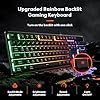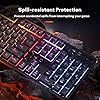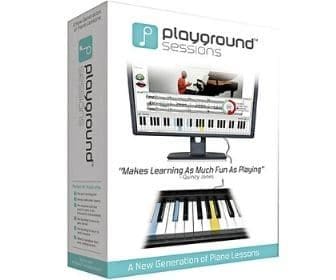Table of Contents
Making Piano Practice Fun and Engaging
Many aspiring pianists often find the repetitive nature of practice to be monotonous and disengaging. However, there are numerous techniques to make piano practice more enjoyable and effective. By incorporating creative methods and maintaining a positive approach, piano practice can transform from a mundane task to an exciting part of every day. This introduction explores various strategies to revitalize your practice sessions and keep the joy of playing piano alive.
Incorporating Games into Your Practice Routine
Integrating games into piano practice can transform a routine session into an interactive and enjoyable experience. Here are some creative ways to embed games into your piano practice:
RockJam RJ761 61 Key Keyboard Piano with Keyboard Bench, Digital Piano Stool, Sustain Pedal, Headphones & Lessons
$159.85 (as of December 20, 2025 22:54 GMT -08:00 - More infoProduct prices and availability are accurate as of the date/time indicated and are subject to change. Any price and availability information displayed on [relevant Amazon Site(s), as applicable] at the time of purchase will apply to the purchase of this product.)Donner DDP-300 Digital Piano with 88 Graded Hammer Action Weighted Keys, Record, Bluetooth, 10 Voices, 4 Reverb, Speakers, Professional Full Fize Key Keyboard Electric Dark Rose
17% OffDonner DEP-20 Beginner Digital Piano 88 Key Full Size Weighted Keyboard, Portable Electric Piano with Furniture Stand, 3-Pedal Unit
15% OffYAMAHA P71 88-Key Weighted Action Digital Piano with Sustain Pedal and Power Supply (Amazon-Exclusive)
6% OffTurn note learning into a competitive game by using flashcards with a timer. Set a timer for 30 seconds and see how many notes the student can correctly name. This not only aids in memorizing note positions but also enhances speed and recognition skills.
Create a game where the student claps or plays various rhythms accurately against the clock. Use a metronome to set different paces and challenge the student to match or adjust their rhythm according to the speed. Keep score, and reward improvements.
Design a treasure map where each clue is a musical interval that needs to be identified on the keyboard. For instance, a “Major Third from C” would lead to the note E. This game enhances knowledge of intervals and encourages exploration of the keyboard.
Engage with scales through an ‘Olympic-themed’ challenge where each scale played correctly earns points. Introduce different categories like the fastest scale, the most accurate scale, and the best crescendo or diminuendo within a scale.
Logitech MK270 Wireless Keyboard and Mouse Combo for Windows, 2.4 GHz, 8 Multimedia Keys, PC, Laptop, Wireless Keyboard Compact Mouse Combo - Black
23% OffRedragon K521 Upgrade Rainbow LED Gaming Keyboard, 104 Keys Wired Mechanical Feeling Keyboard with Multimedia Keys, One-Touch Backlit, Anti-Ghosting, Compatible with PC, Mac, PS4/5, Xbox
20% OffLogitech K270 Wireless Keyboard for Windows, 2.4 GHz Wireless, Full-Size, Number Pad, 8 Multimedia Keys, 2-Year Battery Life, Compatible with PC, Laptop, Black
33% OffEPOMAKER x Aula F75 Gasket Mechanical Keyboard, 75% Wireless Hot Swappable Gaming Keyboard with Five-Layer Padding&Knob, Bluetooth/2.4GHz/USB-C, RGB (Light Blue, LEOBOG Reaper Switch)
13% OffA game to improve the student’s timing and rhythm reaction—start the metronome at a slow tempo and gradually increase it. The student must continue to play a piece or scale in time with the metronome, trying to ‘keep up’ without making mistakes.
Adapt the classic game of hangman to use musical terms or pieces’ titles. It’s an excellent way for students to learn new musical vocabulary and reinforce existing knowledge while having fun guessing letters.
Create a dartboard with different dynamics marked in each segment (e.g., pp, p, mp, mf, f, ff). The student plays a dart to determine the dynamic level they should apply to a specific segment of their piece. This enhances their expressive playing.
Learning New Songs to Keep Practice Interesting
One effective way to maintain enthusiasm and interest during piano practice is by continuously adding new songs to your repertoire. This not only keeps the practice sessions engaging but also helps in developing a diverse skill set. Here are some tips on how to approach learning new songs:
Setting Up Challenges to Boost Motivation
Creating challenges during piano practice can effectively heighten engagement and motivation, keeping the learning process fun and exciting. Here are some elaborated methods on how to set up these challenges:
Set clear, quantifiable goals such as mastering a specific piece, improving a particular skill, or increasing practice time incrementally. Use tools like practice journals or digital apps to track progress and set up rewards for each milestone achieved.
Create challenges based on time, such as “20 minutes a day for 30 days”. This helps develop consistent practice habits. Gamify the experience by allowing achievements to unlock with each level of commitment met.
Challenge students to learn a new piece every month or to add a certain number of songs to their repertoire within a stipulated time. This kind of challenge not only broadens their musical exposure but also enhances sight-reading skills and music theory knowledge.
Periodically, set up a mini-concert or a recital where students perform what they have learned in front of an audience. This can be in a formal setting, like a recital hall, or informal settings like family gatherings. Performing boosts confidence and provides a concrete goal to work towards.
Engage in friendly competitions whether within the same practice group, against oneself, or through online platforms where they can compare scores with others globally. These competitions can inspire dedication and persistence.
Encourage creating original pieces. This creative endeavor can be particularly rewarding and engages different musical skills, promoting a deeper understanding of music theory and composition techniques.
Incorporate technology by using online platforms and apps that offer interactive learning experiences, like rhythm games or virtual duets with other musicians. These platforms often provide real-time feedback and scoring systems, adding an extra layer of excitement and challenge.
Practicing with Friends
Practicing piano with friends can transform a routine session into an enjoyable and highly productive experience.
When you invite a friend to join your practice session, it creates an opportunity to share techniques,
learn from each other, and motivate one another. You can set up mini competitions or play duets
that are not only fun but also enhance your timing and listening skills. Ensure both players switch roles between
leading and accompanying to gain balanced insights and skills. Social interaction while practicing can also
lighten the atmosphere, making the learning process less isolated and more engaging.
Joining a Piano Group
A piano group or ensemble offers a broader community experience compared to one-on-one sessions. Whether it’s a
formal group facilitated by music schools or an informal gathering organized by community members, being part of a
piano group can significantly enhance your learning curve. In these groups, members typically share insights,
play ensemble pieces, and receive collective feedback. Such interactions not only improve your musical skills
but also deepen your understanding of different musical styles and techniques. Moreover, regular sessions in a group setting
can provide the motivation needed to maintain a consistent practice schedule. It’s also a great venue for networking
with other musicians and can lead to opportunities for collaborative performances and projects.
Rewarding Yourself for Milestones Achieved
Incorporating rewards into your piano practice routine can add an element of excitement and satisfaction, reinforcing positive behavior and maintaining motivation. Here are some effective ways to reward yourself for milestones achieved:
First, it’s important to set clear and achievable milestones. These could be learning a particularly difficult piece, mastering a new technique, or consistently practicing for a set number of hours each week. By setting specific goals, you can measure your progress and determine when a reward is deserved.
For smaller achievements, consider giving yourself minor treats. This could be something as simple as enjoying your favorite snack, taking a break to watch an episode of your favorite show, or spending extra time on a hobby you love. These small rewards can make daily practice more enjoyable.
When you reach more significant milestones, think about bigger rewards. This could include purchasing new piano sheet music, a new piece of equipment like a metronome or pedal, or even a night out to celebrate. The anticipation of a larger reward can serve as a powerful motivator to keep pushing forward.
Design a structured reward system that tracks your progress and outlines the rewards for each milestone. For example, you could create a chart or use an app that helps you visualize your achievements and keeps you accountable. Knowing exactly what you are working towards can provide clarity and motivation.
Sharing your achievements with friends and family can be a rewarding experience in itself. Their encouragement and praise can provide an additional boost of motivation. You might also consider sharing your progress on social media or piano forums to gain broader feedback and support.
Make sure the rewards are personalized and meaningful to you. What works for one person might not work for another. Consider what makes you feel truly rewarded and tailor your system accordingly. This could be anything from a spa day to a new book or an outing with friends.
Take time to reflect on what you’ve achieved before moving on to the next goal. This reflection can be a rewarding experience, allowing you to appreciate how far you’ve come. It can also provide valuable insights into what strategies were most effective, helping you to refine your practice routine going forward.
Incorporating these reward strategies can transform your piano practice into a more enjoyable and engaging activity. By regularly rewarding yourself for your hard work and progress, you’ll stay more motivated and committed to your musical journey.
Conclusion
Making piano practice fun and engaging is essential for sustained interest and improvement. Incorporating variety in practice sessions, using technology and apps, and setting manageable and clear goals can greatly enhance the experience. Additionally, allowing for some creative freedom and using games and challenges can make practice more enjoyable. Ultimately, the key is to keep the practice sessions lively, dynamic, and interactive. By following these strategies, learners are more likely to stay motivated and see continuous progress in their piano playing skills.
















































